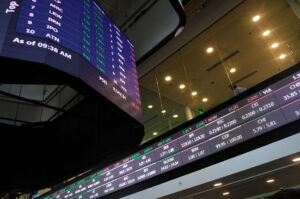REGULATORS should consider easing requirements for listing in the Philippine stock market, as well as reducing fees, to encourage more companies to go public, the Organisation for Economic Co-operation and Development (OECD) said.
In its Capital Market Review of the Philippines released on Wednesday, the OECD said the number of newly listed firms and capital raised via initial public offerings (IPO) in the Philippines have been the lowest among the Association of Southeast Asian Nations (ASEAN) since 2000.
“The authorities could consider easing listing requirements to encourage the listing of companies with growth potential,” it said.
The OECD said the listing process is lengthy and “suffers from organizational challenges, with requirements being less flexible than in peers.”
“As stock market conditions are highly sensitive to timing, delays in the listing process may discourage companies from pursuing an IPO. Lengthy review periods can cause companies to miss optimal market windows, potentially affecting their valuation and investor interest,” it said.
In the Philippines, public equity offerings require the approval of both the PSE and Securities and Exchange Commission (SEC).
The OECD recommended that the SEC and PSE collaborate to expedite the IPO approval process to encourage more companies to list on the stock exchange.
“A single listing submission process and a three-month commitment for IPO approval could streamline the process,” the OECD said.
SEC Commissioner McJill Bryant T. Fernandez said the commission has streamlined the requirements and shortened the process for IPOs, implementing a 45-day processing period.
The OECD also said regulators should reduce fees, simplify their structure and lower the stamp duty tax. It noted that listing fees in the Philippines are also “relatively high,” and the fee structure is “more complex” than its peers.
Compared with the Philippines’ peer countries, the initial listing fee on the main market is relatively high at $150 million (P8.3 billion). It is, however, in line with most peers for a small IPO worth $10 million (P556 million) on the Small and Medium Enterprises (SME) Board.
“If you look at the listing fees of PSE, we’re talking about half of a basis point. That’s less than one-tenth of 1%. That’s our listing fees,” he said. “And I don’t think that is a deal breaker for anybody who wants to list,” PSE President Ramon S. Monzon said during a panel discussion on Wednesday.
“When you talk about listing fees, the biggest component would be the underwriting fees… I think it’s probably high because with the low liquidity of the market, there’s high risk for them,” he added.
POTENTIAL IPO CANDIDATESAccording to the OECD, there are about 400 private enterprises that have the potential to go public. It cited data in 2021 when there were 411 large unlisted nonfinancial companies with assets above P5.6 billion.
“In the Philippines, public equity markets could be expanded by bringing more companies to the market,” it said.
SEC’s Mr. Fernandez said the PSE has been encouraging smaller firms to list on the SME board.
“We have been considerate and reasonable in terms of applications for incentive relief for certain entities just to be able to assist them, to handhold them, and ultimately, be able to launch their respective offerings,” he said.
“But more than that, maybe the universe is not confined to the 400, and that’s why we are going around the entire country to call on our MSMEs in our capital market roadshows [to] check on or get a feel of their interests to tap the capital markets,” he added.
The OECD noted there are many IPO candidates within the universe of large unlisted companies and among state-owned enterprises (SOE).
There are no SOEs, which are also known as government-owned and -controlled corporations (GOCC), listed on the PSE.
They make up a significant share of market capitalization in other ASEAN countries like Singapore, Indonesia, Malaysia and Vietnam, the OECD said.
It said the Philippines could expand capital markets by listing the minority stakes of financially significant SOEs.
“Among these companies two banks stand out in terms of total assets, net worth and income as potential candidates for a stock market listing — Land Bank of the Philippines with total assets of P3.1 trillion ($61.5 billion) and Development Bank of the Philippines with total assets of P1 trillion ($20 billion),” it said.
“However, some of these SOEs are chartered institutions and a legislative amendment may be required in order to incorporate and restructure them for listing.”
The OECD said SOEs should undertake reforms to enhance their performance, governance and management before listing.
This year, there were only three IPOs, falling short of the PSE’s target of six. These were mining company OceanaGold Philippines, Inc. and renewable energy companies Citicore Renewable Energy Corp. and NexGen Energy Corp.
For 2025, the PSE is expecting to have six IPOs and is looking to raise up to P150 billion worth of capital. — Sheldeen Joy Talavera

